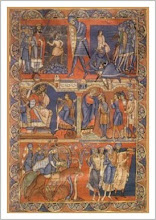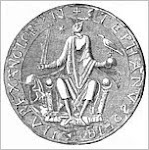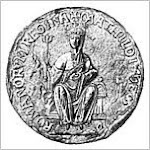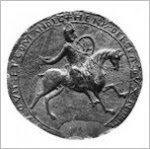England had experienced a period of peace after the reconquest of the Danelaw in the mid tenth century by King Edgar. However from 980AD small companies of Danish adventurers carried out a series of coast line raids against England. Hampshire, Thanet, and Cheshire were attacked in 980AD, Devon and Cornwall in 981AD, Dorset in 982AD, and in 988AD a battle was fought between the Danish and the thegns of Devon.
The main historical importance of these events in this context is that they brought England into diplomatic contact with Normandy for the first time. The Danes would occasionally seek port in Normandy upon returning from a raid on England. As a result tension between the English and Norman courts grew, and when word of their enmity eventually reached Pope John XV he took steps to broker a peace between England and Normandy, which was ratified in Rouen in 991AD.
In the same year Edgar's 24 year old son, King Ethelred II, who would eventually marry Emma of Normandy in 1002, sat on England's throne and a sizable Danish fleet began a sustained campaign in the southeast of England. In the aftermath of The Battle of Maldon it was decided that the English should grant the tribute to the Danes and a gafol of 10,000 pounds was paid to them for their peace. It was a peace destined not to last and the raids would continue.
In 1016 England submitted to the Danish King Canute. He married Ethelred II's widow, Emma of Normandy, and by her had two sons who succeeded him after his death in 1035, namely Harold Harefoot 1035-1040 and Hardacanute 1040-1042.
Prominent among the nobles at this time was the Wessex earl, Godwin, who had already earned Edward's enmity when he captured his brother Alfred and had him blinded after an unsuccessful attempt by them to depose Harold Harefoot in 1036. The dynamic between Edward and the Godwin family would continue to dominate Edward's reign after his ascension to the English throne.
Edward was duly invited by the Witan to return to England in 1041 and according to the Anglo-Saxon Chronicle was sworn in as king alongside his half brother Hardacanute. After his death in 1042 Edward became king and was crowned in April, 1043. However, having been raised and educated in Normandy during the twenty six years of Danish rule it would appear that Edward returned to England more Norman than English, bringing with him Norman friends and clergy which frustrated the both the English and Danish barons alike. He was supposedly monkish in his ideals and his chief interest was the Church. He married Edith the daughter of Godwin in 1045, moved the royal court from the walled city of London to his new Palace of Westminster, and set about founding Westminster Abbey. Meanwhile, despite a brief period in exile in 1051, the Godwin family maintained their powerful stranglehold over the affairs and crown of England. When Edward died childless in January 1066, the Witan elected Harold as his successor. Edward was canonised as a saint in 1161.
• The Anglo-Saxon Chronicle: The years 1052-1069
A Note about Emma of Normandy:
Emma born c.985 was the daughter of Richard the Fearless, Duke of Normandy and holds the distinction of being the wife of both Ethelred II the Unready and Danish King Canute. In addition to being Queen twice, two of her sons, one by each husband, Edward the Confessor and Hardacanute, and two stepsons, also by each husband, Harold Harefoot and Edmund II Ironside, became kings of England. Her great nephew William the Conqueror, Duke of Normandy would become king of England in 1066.
In an interesting twist to her story, Emma did not support her son Edward when he became King of England on the death of Hardacanute. Stranger still perhaps, apparently in both her marriages she was known as or called Aelfgifu, firstly in deference to Ethelred's first wife Aelfgifu, and then in her marriage to Canute as Aelfgifu of Normandy. Emma died in 1052.
• Encomium Emmae Reginae
 The Encomium Emmae was written under her patronage. Interestingly, her marriage to Ethelred is not mentioned in this account but her marriage to Canute is.
The Encomium Emmae was written under her patronage. Interestingly, her marriage to Ethelred is not mentioned in this account but her marriage to Canute is.








No comments:
Post a Comment